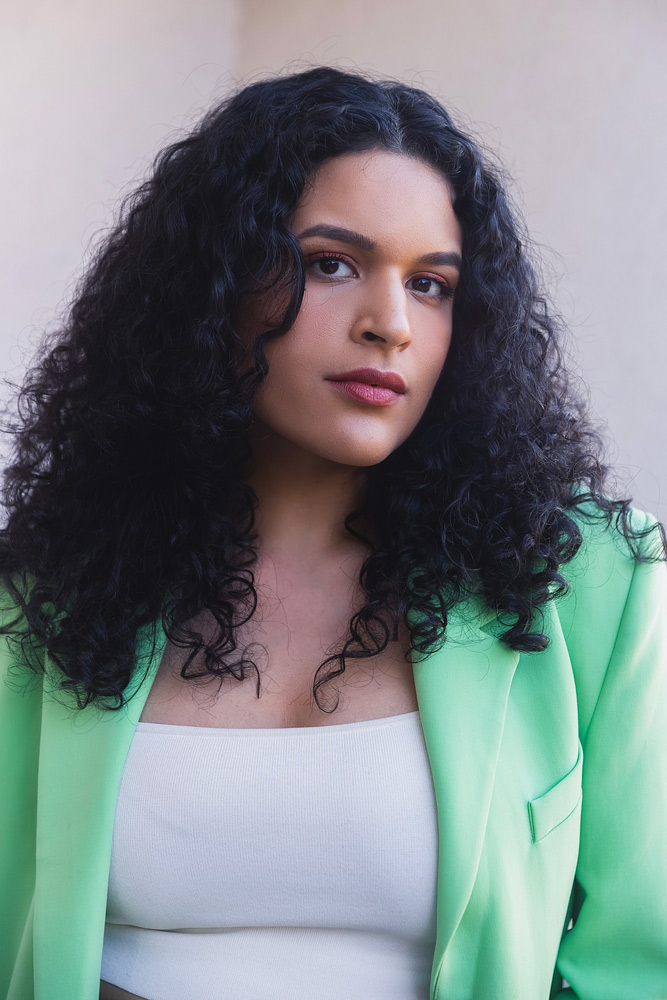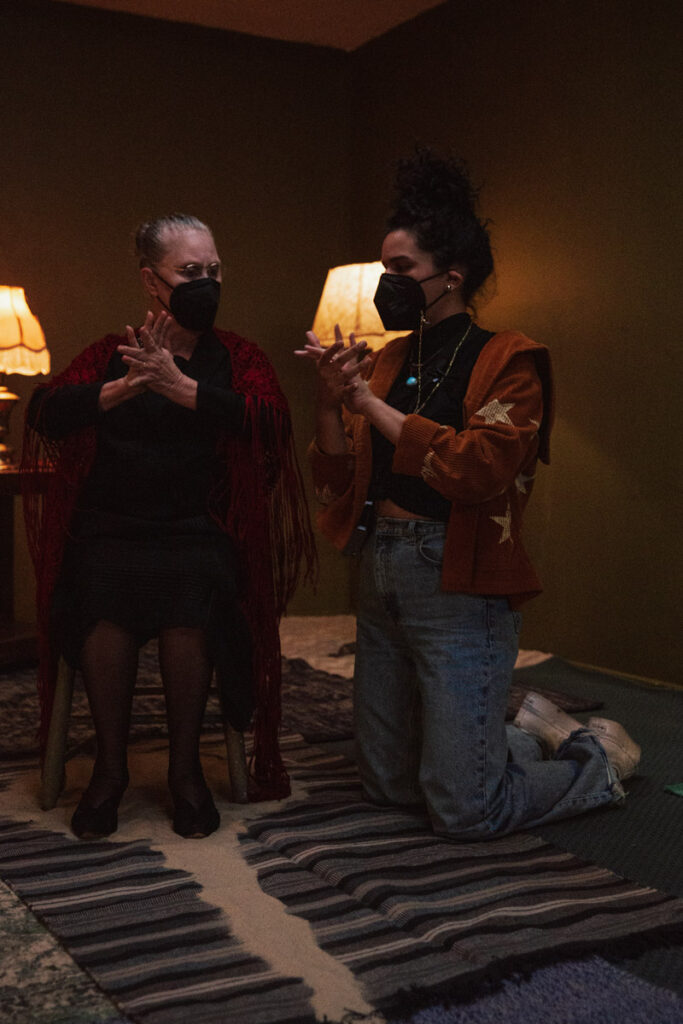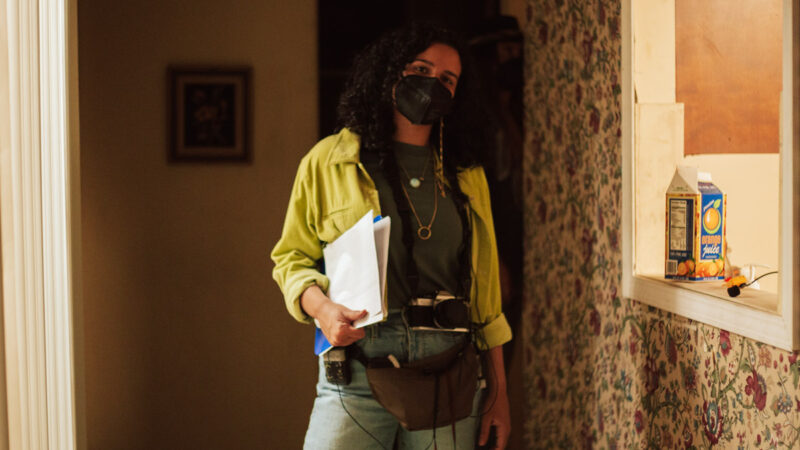Gabriela Ortega BFA ’17 is the quintessence of an artist with an endless stage, undeniably driven to be the change she hopes to see in her craft. And when she shares her goal of elevating her culture and the Latin American community through her work, you can be certain she’s making that happen.
“The way I see it, instead of making a seat at the table, I’m making my own table,” the acting alumna said.

As a director, actor and writer, Ortega has been connected to top industry organizations like Sundance Institute, Center Theatre Group, HBO and Netflix, among others. Her work as a screenwriter and playwright; stage, screen and voice-over actor; and film director have earned her several accolades and fellowships in her burgeoning career.
And as her career continues to climb, Ortega carries her SDA training with her the most.
“… knowing that it’s there and no one can take that from me. … having a process, even as you customize it along the way, that’s the part of the artist that nobody else can touch,” she said.
Telling the stories of her community
In February, Ortega was named one of six directors selected for the second season of the Disney+ Launchpad short film program. She will be directing a film written by Joel Perez and Adrian Ferbeyre called Beautiful, FL, a live-action short about a teenager who scrambles to fix the family RV in time to share her tia abuela’s special flavor at the city of Beautiful’s annual ice cream competition.
Also recently, the alum’s short film Huella, which she wrote and directed, played at the 2022 Sundance Film Festival and 2021 Tribeca Film Festival. It tells the story of a disenchanted flamenco dancer turned desk job worker, who must face grief and a generational curse unleashed by her grandmother’s death.
The film was supported by the Rising Voices initiative, a program created by Lena Waithe’s Hillman Grad Productions company in partnership with Indeed to invest in and share stories created by BIPOC filmmakers and storytellers.
“Gabriela has so much to give to this artistic world and I am sure that all those incredible stories she has not yet told will be produced because she’s unafraid and has the strength, energy, passion, talent and discipline to do so,” said multi-hyphenate artist and SDA faculty member Denise Blasor, who performed in the film as the grandmother, Leonora Garcia.
The pair met in 2014 during casting for the SDA production of Anna in the Tropics, for which Blasor was the director and Ortega performed as Conchita. Blasor recalled immediately wanting to work with Ortega because of her “passion, artistry, truthfulness, excitement, imagination, professionalism and positive energy.”
“Working with her has always been a creative joy and being directed by her was exciting and fun as well. Because we know each other well and trust each other, it made the experience even more magical. The student becoming the teacher, what a perfect circle,” Blasor said.
Making the leap to directing
Ortega began directing in early 2019 and fell in love with it. Then, the pandemic hit, so she pivoted from acting and focused on her work as a director — developing her own projects, using the time to gain as much experience as possible and building her portfolio.

“I started to realize: I know how to do this. I know how to break down a script. I know how to talk to an actor,” she said.
As a director, Ortega leans into her acting and theatre background, incorporating theatrical elements into her work. She also takes the opportunity in this role to evaluate her own “blind spots” as she strives for her work to emulate the inclusivity she hopes to see in the industry.
“… one thing that’s important to me is acknowledging that I’m not the first person doing this kind of work. Obviously, there are so many people that are doing such good work and, for me, it’s more about being part of that and continuing that …” she said.
From the Dominican Republic to USC
First arriving to California at the age of 17 from the Dominican Republic, Ortega recalled feeling like an outsider but was resolute in finding her place in the city and at USC.
“I didn’t feel like the industry at large portrayed Latinos. I knew it was up to me to do that,” she said.
As a student, Ortega set out to hone as much of her artistry to reach that objective.
“The girl that came in the first day and the girl that left are two different people,” she remembered.
Ortega took every opportunity she could — including attending student improv shows, building a rapport with her professors, putting on a solo show and taking on a variety of acting roles.
“I really encourage anyone at school right now to not limit themselves because the industry is going to do that to us, they’re going to typecast us. That’s why I like that I got to play a mom of three when I was 21, and one of my last plays at USC, I got to be a French courtesan. That’s why we go to school. We go to school so we can foster a creative brain before the world tells us what to do,” Ortega said.
Paying it forward
Even after graduation, Ortega’s desire to learn and make the most out of her experiences continued. She took on various acting gigs to keep her skills polished and to allow her to network within the industry — all while working three day jobs.
“I think a big part of adulting was sort of creating that life for myself. And looking back at it, I can see how maybe Gabriela — at age 21, 22, 23 — was overcommitting, was probably working too much for free and was exhausted,” Ortega reflected with a laugh. “But, if I didn’t have that, then I wouldn’t: A. know what I want to do now, B. have all the experience I have, and C. have the respect and the reputation, and the social network I have now…”
Since those early post-college days, Ortega has found a happy balance between her professional and personal life, making sure to care for her mental health and to find joy outside of her work. She cited her community as critical to that equilibrium and to her success, which is why the artist wants to do the same for others through SDA’s student-alumni mentorship program.
“The first year after college, it was brutal. You need that community. If I can be a part of that, I’m happy to do it,” Ortega said. “I just want those that are graduating, especially in these crazy times, to know that they have a community.”
